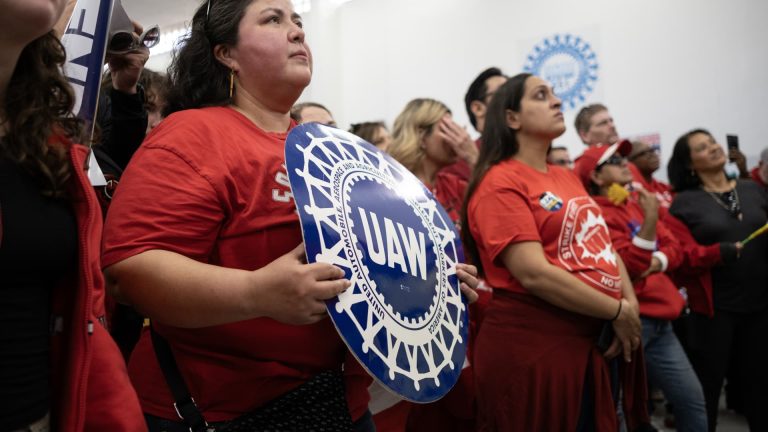DETROIT – The United Auto Workers achieved record contracts with the Detroit automakers following contentious talks and roughly six weeks of targeted labor strikes. But not all of the union’s members are satisfied with the tentative agreements.
The deals, which were recommended for ratification by UAW leaders, are each currently on pace to pass. Yet they’ve received notable rejections at major Ford Motor and General Motors plants in recent days. Workers at Chrysler-owner Stellantis are still in early voting but have so far largely backed the contract.
GM’s Spring Hill Assembly plant in Tennessee on Monday became the most recent major facility to vote against the contract, with 67.5% of UAW members rejecting it. That came after 52% of members at GM’s Flint, Michigan, truck plant voted against the deal. At Ford, the automaker’s Kentucky Truck Plant – its largest in terms of employment and revenue – had 54.5% of members vote against it.
Reasons behind the disapproval vary, according to industry experts and UAW members who spoke with CNBC. They range from veteran workers not receiving as much as newer employees under the terms of the deals, including retirement benefits. They’re also concerned about language in the tentative agreements. There’s also lingering distrust in union leadership after past corruption scandals of former leaders.
Others cite inflated expectations from UAW President Shawn Fain regarding 40% pay increases, traditional pensions and retiree health care for all, the elimination of “tiers” and a 32-hour workweek.
“I don’t think the tentative agreement goes far enough. I think it’s divisive. It doesn’t get rid of the tiers, and it doesn’t meet all of our needs as a whole,” said Brian Keller, a former UAW presidential candidate in several past elections and an outspoken worker from Stellantis’ Mopar parts operations. “You gotta remember, we were stagnant from the time of the bankruptcy to 2015. We didn’t get no wage increases.”
Record deals, with some caveats
The UAW’s tentative agreements with automakers include:
- 25% wage increases, including 11% upon ratification
- reinstatement of cost-of-living adjustments to pay
- a three-year progression to top wages instead of eight years
- billions in new investments
- the inclusion of some battery workers
Major targets they didn’t include:
- 40% general wage increases
- complete elimination of wage and benefit tiers
- a 32-hour workweek
- post-retirement health care coverage and traditional pensions for all
According to UAW voting trackers, Ford is closest to ratifying the pact, with roughly 65% approval, as most major plants have already voted. GM has had 52% of workers voting so far in support of ratification. Stellantis, which remains in early voting, currently has roughly 82% of members in support of the pact. However, most of its major plants still need to vote.
The UAW did not immediately respond for comment on the voting results or when the union expects voting to end. Each local UAW chapter conducts its own voting.
The union has touted the deals as achieving $23 billion in new gains for the union – four times more than during the last negotiations in 2019. There were also more gains for veteran workers than the entirety of the last deals, and a historic step in achieving “equal pay for equal work,” a cornerstone of organized labor, according to the union.
The union prioritized reinstatement of cost-of-living adjustments, or COLA, over increases in some bonuses, including ratification ones that dropped from as much as $11,000 during the last round of negotiations four years ago to $5,000 under these tentative agreements.
What is Fain telling members?
Fain, who spoke Tuesday during a U.S. Senate committee hearing, has continuously said UAW members are the highest power in the union and will ultimately decide whether the deals ratify. But Fain last week conducted an online broadcast in an attempt to smooth over some concerns, including about COLA, bonuses and other issues.
“I truly believe these are record contracts and are a major victory for our movement,” Fain said Wednesday amid voting. “There were many in the media and in the corporate class who were saying we didn’t know what we were doing. And they thought we’d never get a deal. But then we got all three.”
Keller, who ran for president against Fain but supported him during a runoff election against incumbent UAW President Ray Curry, said he also has concerns over consolidation of Mopar parts facilities, potential layoffs in the future and other language in the contract.
Timothy Orner, who works in fleet operations at Stellantis’ Jeep complex in Toledo, is concerned about changes to 401(k) benefits that are based on 40-hour work weeks at a 10% company contribution compared to a 6.4% contribution based on annual pay, including overtime.
“Just because it’s a double-digit number, it doesn’t make it better,” said Orner, who was among the first second tier workers to be hired in 2009 without a traditional pension and lower benefits. “There’s no more ’30 and out.’ They want you to work longer, to do things longer.”
The UAW did not immediately respond for comment regarding the 401(k) change, which is outlined in the deal.
Fain last week admitted to not achieving everything he wanted for UAW retirement, including pensions and health care. He said these benefits remain a target for future bargaining when the tentative deals, if ratified, expire on April 30, 2028.
What are veteran workers’ concerns?
A veteran Ford worker of 25 years said there’s frustration that Fain didn’t achieve what he promised to reward traditional, or Tier 1, employees compared to newer hires, also known as in-progression or Tier 2 workers.
“Tier 1 gave back in 2008 and we feel we lost a lot of money over 17 years,” said the worker, who asked not to be named for fear of criticism or retribution by the union. “It’s sad that this group of people worked an entire career without ever getting their money. He did not come through. He made Tier 2 whole.”
China Jones, a 23-year worker at Louisville Assembly Plant, shared a similar sentiment. “Older veterans like us made the sacrifices for them (the automakers),” she told a local television station. “And we don’t get nothing out of it.”
GM, which has the lowest support thus far for the deal, has the most amount of traditional workers on a percentage basis, followed by Ford and then Stellantis. Stellantis also had far more usage of temporary workers, who will largely be converted to full-time employees and be eligible for top wages by the end of the deals.
“The [workers] hired before 2008 are going to be less thrilled with the contract, primarily because they’re going to get the 25% that everybody got, but the new hires temporary and progression workers could get up to 160% or so,” Art Wheaton, a labor professor at the Worker Institute at Cornell University. “It can be plant-by-plant for the ratification votes based on what are their demographics in that particular location.”
What happens next?
If members at one of the automakers such as GM vote down their pact, UAW leaders would have to decide the next steps regarding whether to return to the table, initiate strikes, or both.
Marick Masters, a business professor at Wayne State University in Detroit, said a rejection of a deal or even closer-than-expected voting could hinder the union’s ability to organize other companies – a goal of Fain moving forward.
“One of the things that workers in non-union facilities are going to look at is this ratification vote,” Masters said. “They’re going to want to know why some workers didn’t vote to ratify given that it’s a record contract … that’s going to be some food for thought that the union is going to have to be prepared to address goes and tries to supervise these facilities.”
Fain has said the union has received an influx of interest and support from non-union autoworkers. He said the UAW still has goals not achieved during these negotiations in its sights.
“There are too many non-union autoworkers and too much power behind the forces of corporate greed for us to win everything we deserve in one go. That’s why we’re building our strike muscle to go even further in 2028,” he said Wednesday.
Following the UAW’s tentative agreements, non-union automakers operating in the U.S. such as Toyota Motor, Honda Motor and Hyundai Motor raised wages for factory workers.
Hyundai said Monday it will raise factory worker pay 25% by 2028, matching the general wage increase won by the UAW during that period, Reuters reported. Toyota raised factory pay 9% to 10% starting in January, while Honda said it will increase wages 11% during the same period.
“We call that the UAW bump,” Fain told senators Tuesday. “That stands for ‘U Are Welcome.'”
Read the full article here









